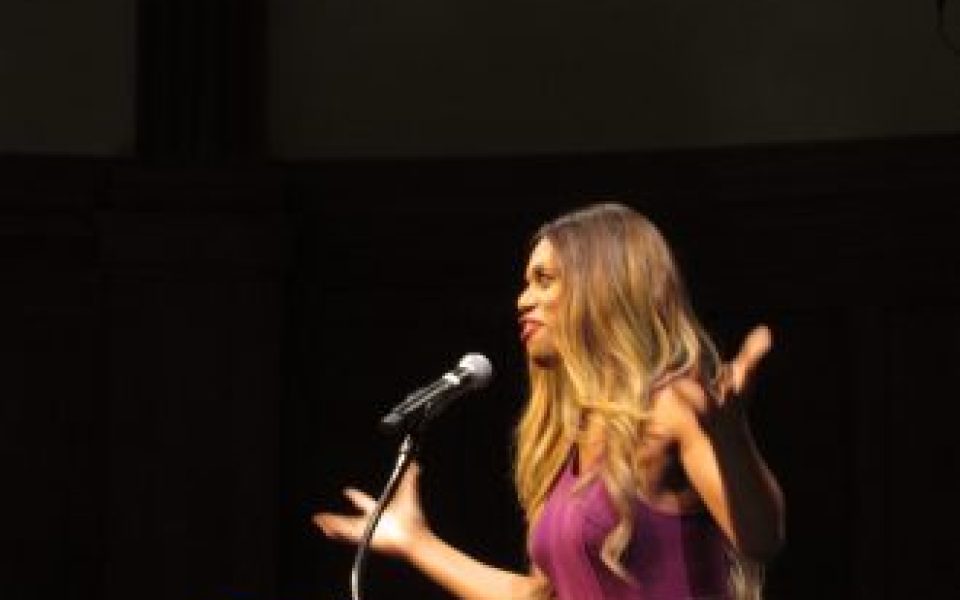by Jordan Green
The transgender star of “Orange Is the New Black” explains the intersection of racism and transphobia before a capacity crowd at Wake Forest University.
Laverne Cox, the acclaimed transgender actress and advocate told a capacity crowd at Wake Forest University’s Wait Chapel on Monday that one of the biggest obstacles facing the trans community is the view some hold that no matter what, “we are always and only the gender that that we are assigned at birth.”
Then, with a triumphant flip of her luxuriant blond tresses, the actress who portrays Sophia Burset on “Orange Is the New Black,” proclaimed, “Yet, ain’t I a woman!”
The refrain, attributed to abolitionist and women’s rights activist Sojourner Truth from a speech in 1851, formed a leitmotif of Cox’s presentation in Winston-Salem. As Cox noted, historians doubt that Truth actually said those words, but they succinctly captured a theme of her speeches.
Cox, who is immersed in the radical feminist theory of bell hooks — emphasizing the intersection of black, queer and female experiences — relished telling a story about Truth. Suffragettes were often accused of being men, Cox said, so Truth opened her shirt and flashed her breasts to silence one particular male heckler during an appearance in Indiana.
“Now, I’m not going to reveal my breasts tonight,” Cox teased. “Sorry to disappoint some of you.”
Cox guided her audience through an account of her upbringing as one of a set of twins born to a single, black, working-class mother in Mobile, Ala. Though the story was harrowing, Cox’s telling was not without flashes of humor. She told of being chased by other kids who said she “acted like a girl” and wanted to beat her up, and internalizing shame when her mother asked her, “What are you doing to make them treat you that way?”
During puberty, when she realized she was attracted exclusively to boys, the passing of Cox’s grandmother precipitated a suicide attempt. Imagining her grandmother’s disappointment, Cox swallowed an entire bottle of pills from the bathroom, and went to bed. Fortunately, she woke up with only a stomachache.
Getting accepted into an arts program for low-income kids in Mobile in third grade saved her life, Cox said.
“My mother told me that I could take dance classes, but I could only take tap and jazz, not ballet,” she recalled. “‘Ballet is too gay.’ This is according to my mother. I’m not entirely sure what her rationale was, maybe something about the tights or something, I don’t know.”
Studying dance set the stage for Cox’s acceptance to the Alabama School of Fine Arts, then to Indiana University and, finally, to Marymount Manhattan College in New York City, followed by an informal education in the 1990s club scene.
“Club kids were these kids who got paid to dress outrageously, and their creativity would astound you,” Cox said. “They would dress in forms of drag and gender nonconformity. They got paid to get dressed up and go to clubs and parties. How awesome is that?”
Getting ushered past the velvet rope with lines around the block and admitted into clubs for free was affirming.
“It was the first time that my gender expression was looked on as something that was valued, that was special, and not something that I was made to feel shame about,” Cox recalled.
Too many transgender people are “in a state of emergency” in the United States, Cox said, citing statistics indicating trans people are vastly over-represented among murder victims, the unemployed and children bullied at school.
She recalled an incident in lower Manhattan on the Fourth of July a dozen years ago when two men accosted her. One of the men who appeared to be Latino tried to hit on her, and the other who appeared to be black ridiculed his friend by saying Cox was a “n****” — essentially a black man. The two men went back and forth, arguing about whether Cox was a “n****” or a “b****.” The misogyny and trans-phobia that the men displayed illustrates the aphorism that “hurt people,” Cox said.
She said she doesn’t believe for a minute that black people are more transphobic, but that it’s important to recognize that the historical emasculation of black men in the United States through lynching and other humiliations has left a lasting legacy of collective pain.
“Often the experience of being discriminated against, being marginalized is so deeply painful that we don’t know what do with it,” Cox said, “so we take it out on each other.”
The actress and advocate said she wants to find out how to creates spaces of healing so people don’t take their pain out on each other.
Jade Boston, a Winston-Salem trans woman who works for American Airlines, said after the program that many of her fellow employees knew her before she began her transition. But having a proud, black trans woman in position of prominence “opens up a window where people are more comfortable to have a conversation.”
But, as Boston mentioned during the question-and-answer session with Cox, her father still doesn’t accept her.
“Trans folks and LGBT people have been creating our own families for years,” Cox said. “Go where it’s warm. Go where people love you and accept you and respect you.”
Join the First Amendment Society, a membership that goes directly to funding TCB‘s newsroom.
We believe that reporting can save the world.
The TCB First Amendment Society recognizes the vital role of a free, unfettered press with a bundling of local experiences designed to build community, and unique engagements with our newsroom that will help you understand, and shape, local journalism’s critical role in uplifting the people in our cities.
All revenue goes directly into the newsroom as reporters’ salaries and freelance commissions.


Leave a Reply